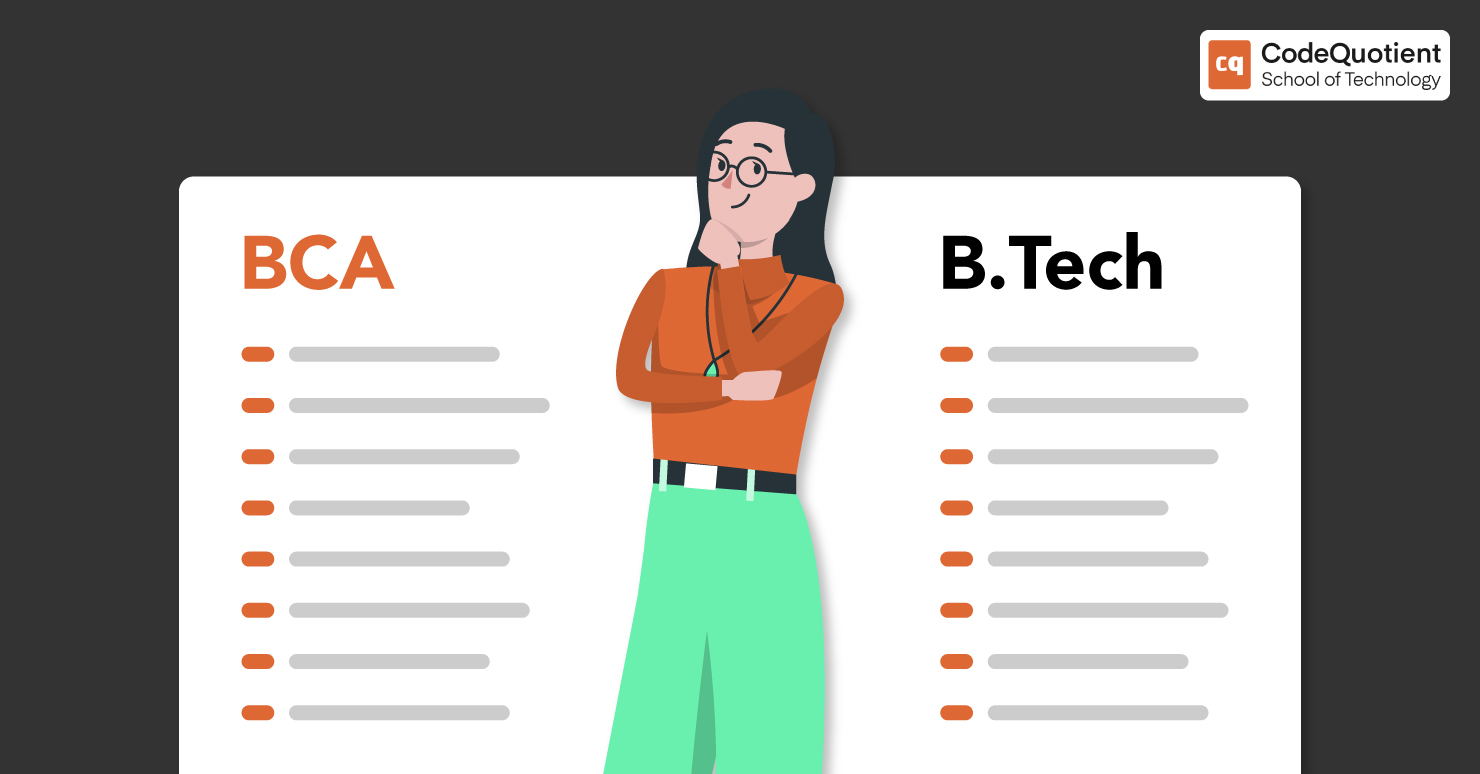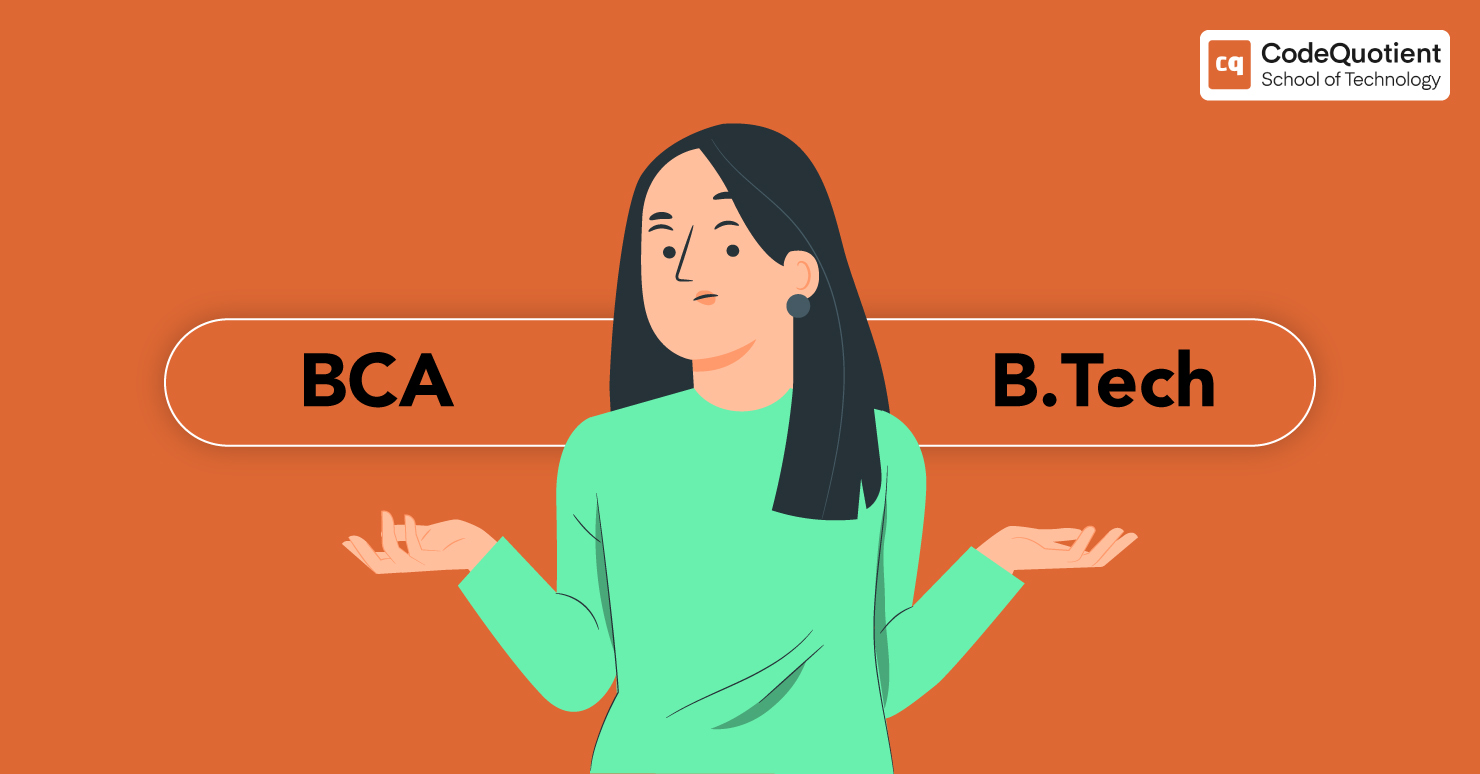As a student, choosing the right professional path is an important decision that will shape your future career. With so many options available, deciding which route to take can be overwhelming. One key dilemma many students face is choosing between a BCA and a B.Tech.
The main question that arises is whether a BCA degree is equivalent to a B.Tech. While both academic paths can lead to rewarding opportunities, it’s important to note that you cannot directly compare the two.
A BCA is a degree course, whereas a B.Tech is an engineering program.
Understanding the intricacies and implications of each option is crucial for making an informed decision that aligns with your goals and aspirations.
Let us go through a comprehensive comparison of BCA vs B.Tech to help you choose the best course.
Is BCA Equivalent to B.Tech: What is BCA?
BCA stands for Bachelor of Computer Applications. It is an undergraduate course designed for those who desire to delve deeply into computer languages and their functionality.
A BCA degree typically covers:
- Software development and computer programming
- Software design
- Logical analysis
- Operations systems
- Database management
- Client/server technology
- Computer languages such as C, Python, C++, and others.
Is BCA Equivalent to B.Tech: What is B.Tech?
Bachelor of Technology is a four-year engineering program that teaches students technical skills, hardware, and software. After two years, students have the opportunity to specialise in their chosen topic of interest.
B.Tech offers a variety of specialisations such as biotechnology, mechanical, civil engineering, and chemical, allowing students to choose a specialisation in which they are particularly interested.
Is BCA Equivalent to B.Tech: 7 Key Differences

Here are the main differences between BCA and B.Tech:
1. Eligibility Criteria
BCA:
To be eligible for a BCA program, applicants must normally get a minimum aggregate percentage of 50% in their 10+2 examination, with a focus on disciplines such as mathematics. Specific criteria may differ among educational BCA institutions.
B.Tech:
The B.Tech course requires 10+2 or equivalent with a minimum of 55% grades from an accredited college or institute. There is a 5% moderation in the reserved categories. Physics and maths should be the primary courses in 10+2.
2. Admission Process
The following is the procedure for BCA and B.Tech admissions:
BCA:
Admission to BCA programs requires a merit-based selection procedure or certain entrance tests administered by the relevant educational institutions. Several universities might also grant direct admission based on merit.
Nonetheless, some institutions hold specific entrance examinations or interviews in which the candidates’ vocabulary, numeric reasoning skills, and logical reasoning abilities are typically assessed.
B.Tech:
Students must pass the entrance tests in order to be admitted to B.Tech programs. The JEE Mains score determines admission to national-level institutions such as NITs, IIITs, and GFTIs.
In addition, entrance examinations at the state or private levels are held for admission to B.Tech programs.
3. Course Duration
BCA:
A BCA degree program lasts three years, whereas a B.Tech degree program lasts four years. The lateral entry takes three years.
B.Tech:
It can vary depending on the institution and country offering B.Tech degrees.
4. Subject Knowledge
BCA:
BCA is an outstanding choice for students who wish to learn about programming languages and database management. The course covers a wide range of topics, including operating systems, Java and C programming, computer networks, and digital computers.
BCA also equips students with a comprehensive understanding of computer applications, allowing them to excel in numerous areas of computer science.
B.Tech:
B.Tech is a four-year undergraduate program that provides students with hands-on experience with cutting-edge technologies and techniques utilised in industry.
AICTE designed the B.Tech curriculum, which covers a wide range of courses such as computer engineering, software engineering, communications, information technology, and electrical and electronic engineering. This course will teach students how to design and implement innovative solutions to complicated issues.
5. Coursе Fееs
Comparatively, BCA courses are less expensive than B.Tech degrees. The costs differ between universities as well as between locations.
6. Higher studies
Course after BCA
Candidates seeking more in-depth information might enrol in advanced degrees such as MCA and PhD. MCA offers a variety of specialisations, including systems management and development.
Aside from the established and tested MCA programs, a BCA graduate can choose one of the following programs for further study:
- Master of Computer Management.
- Postgraduate program in Corporate Studies.
- Information Security Management.
- Master of Business Administration.
- Master’s degree in information management.
Course following B.Tech
After obtaining a B.Tech degree, a student can pursue a master’s program in their primary engineering topics, as follows:
- Masters of Technology or Masters in Engineering (M.Tech/ME).
- Master of Business Administration.
- Postgraduate Diploma in Management (PGDM).
7. Top Job Rolеs
After completing a B.Tech curriculum, graduates can explore a variety of employment possibilities, including
software and mechanical engineers, and electrical, civil, electronics, and communication engineers.
On the other side, after successfully completing a BCA curriculum, graduates can explore numerous job options, such as software developer, database administrator, system analyst, web developer, and technical writer.
CodeQuotient School of Technology: Best Alternative to Conventional BCA Programs?
CodeQuotient School of Technology (CQST) provides a top-notch Bachelor of Computer Applications (BCA) program that embodies modern learning with ample exposure to the IT industry. Students receive a comprehensive educational experience with a curriculum tailored to meet the dynamic demands of the continuously changing IT sector.
CodeQuotient’s innovative 3-year program combines a traditional BCA degree with an Under-Graduate Program in Software Engineering (UGPSE). This unique blend offers both theoretical computer science foundations and intensive, hands-on software development experience.
- Students learn in-demand technologies, build real-world projects, and gain up to 1.5 years of paid internships with hiring partners.
- Sponsorship opportunities are available, and graduates are awarded a UGC-recognised BCA degree, along with certification and valuable industry experience for building impressive portfolios.
Final Note: Is BCA Equivalent to B.Tech?
B.Tеch is an ideal course for individuals interested in gaining a thorough understanding of engineering principles and seeking opportunities in a variety of fields, such as software development, systems engineering, and electronics.
On the other hand, BCA is geared toward those with a strong interest in computer applications and software development, providing specialist expertise in web development, software engineering, and database management.
Both programs lay a solid foundation for professional growth and development, ensuring a bright future in the ever-changing world of technology and computer science.
To learn more about the BCA degree, contact CodeQuotient and begin your journey today!




